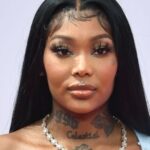
Source: Andrew Soria / EyeEm / Getty
I still remember my earliest encounter with breastfeeding. My aunt was nursing my baby cousin at a Christmas party and I had accidentally walked in on them in a private room. I was 13-years-old, and though I was at an age where I was uncomfortable in my skin and ashamed of my small breasts, I thought how amazing the woman’s body is to be able to sustain life with the nourishment necessary for development and growth.
Women in my family breastfed their children and considering formula as a means to nourish a baby was laughable to them. Family members with low milk supply received milk from another breastfeeding family member–my aunt being one of them. I remember asking:
“Why even go to that length of getting milk from someone else when you could just supplement with formula?”
“Breast is best,” my aunt echoed.
These words would come to haunt me–through breastfeeding ads in the ob/gyn office, to my mother who made it painfully obvious she wanted grandchildren from both her daughters, and bragged on how breastfeeding was responsible for why all of her children were tall, healthy and successful. She was proud of having breastfed me and my siblings till the age of two. She wanted nothing less for her future grandchildren. This is probably how I developed my obsession–and subsequent disappointment.
I finished my postgraduate program when I was 25 years old. Right out of school, I became an assistant professor at a school of pharmacy and entered a serious relationship. My partner and I were talking about marriage and children.
In that same year, my twin sister and I tested positive for the BRCA-2 gene, a mutation that increased the potential of developing breast cancer by up to 80percent. I was told that a prophylactic double mastectomy to remove my breast tissue was the wisest option. It sounded absurd to remove my perfectly normal breasts at the likelihood of breast cancer. I decided against this option because why would breast cancer happen to me?
I opted for annual breast MRIs instead as a measure of close monitoring. Three months after my 28th birthday, my annual scan revealed suspicious activity that needed to be biopsied. Three days later, the results of that biopsy changed my entire life.
“Brooklyn, I am so sorry but I regret to inform you that you have breast cancer.”
I was devastated. My diagnosis came with a number of appointments, cancer treatment, a double mastectomy, and the opportunity to breastfeed. My life was spared but my idea of being a “good mother” was tied to breastfeeding. The thought that I would not be able to produce milk for my future babies was soul crushing. I could not shake the feeling of losing that God-given gift in that moment.
The “Breast is best” public health campaign launched by the World Health Organization in 1991 is a household slogan as pro-breastfeeding organizations pushed the notion that all babies should be exclusively breastfed from birth through their first six months of life. Granted, the research does not lie when it comes to the benefits of a child receiving breast milk. Breast milk has an ideal mix of vitamins, proteins, fat and antibodies that assist in creating a protective defense for a child.
However, constantly seeing and hearing this mantra while knowing I won’t be able to breastfeed, is triggering. I feel a sense of public judgement and disapproval. I feel shame. The public won’t look at me and think “Oh, she had breast cancer and that’s why she isn’t breastfeeding.”
Now that my hair has grown back from chemotherapy and my breast reconstruction is complete, I don’t get a “cancer hallpass” any more. What people will see and believe to be true is that I am an able-bodied woman who can provide breast milk to her child and chose not to. That’s what hurts. They won’t know my story, that my breasts were amputated to fight cancer. They won’t know that I would have given anything to be able to provide my children the “liquid gold.”
There are numerous reasons a new mom may be unable to breastfeed: a child not latching, inverted nipples, low milk-supply and in my case, a double mastectomy from cancer. I challenge others to stop using “breast is best” and understand women who can’t nurse are at a disadvantage. I find it even more important and inclusive to spend equal efforts educating the mothers who choose or have no choice but to formula-feed their child. I wish we spent more time educating new mothers on mixed-feeding and explaining how to supplement with formula if their child is not getting enough nourishment from exclusively breastfeeding. I wish we spent more time teaching new mothers how to select the appropriate formula for their baby and performing appropriate mixing ratios with water. I wish we spent more time providing formula storage and handling information so that mothers feel well equipped and knowledgeable when they are at home or on the go.


